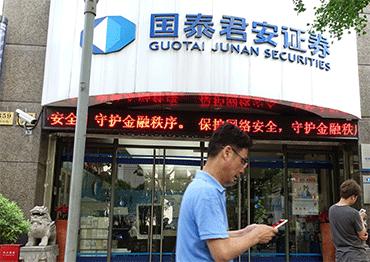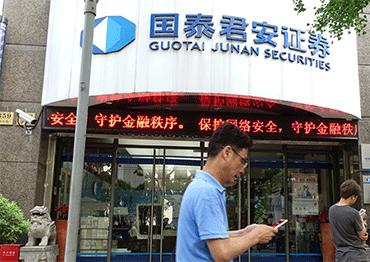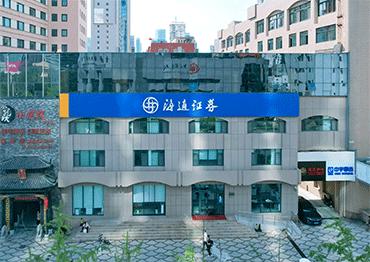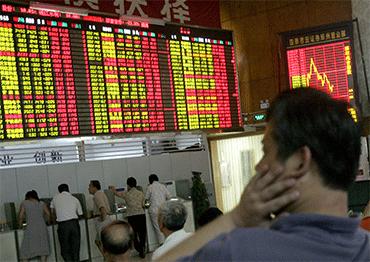A pending merger of two Shanghai-based State-owned brokerages, Guotai Junan Securities and Haitong Securities, is set to be a major step in China’s strategy to build globally competitive investment banks.
With combined assets of around 1.68 trillion yuan (US$238.4b) based on last year’s earnings reports, the new entity would surpass China’s largest player CITIC Securities, whose assets in 2023 totaled 1.45 trillion yuan (US$210b).
In the largest deal in China’s securities industry since the country’s first stock market opened in Shenzhen in 1990, Guotai Junan is acquiring long-time rival Haitong through a swap of A-shares (traded on the Shanghai and Shenzhen stock exchanges) and H-shares (traded on the Hong Kong Stock Exchange).
“The merger is significant enough to signal a new trend in the securities industry, shifting toward scale and concentrated development,” Tian Lihui, dean of the Institute of Finance and Development at Tianjin-based Nankai University, told NewsChina.
Though still subject to regulatory approval, the deal announced on September 5 aligns with opinions on building first-class investment banks, which was released in March by the China Securities Regulatory Commission (CSRC). The goal is to have two to three globally competitive investment banks by 2035.
The Shanghai Stock Exchange issued both brokerages a maximum 25-trading-day suspension on September 6 due to the merger.
On October 9, the firms announced the terms of the swap: one Haitong share would be exchanged for 0.62 Guotai Junan shares in both the A- and H- share markets.
The next day, shares for Guotai Junan and Haitong surged upon their resumed trading, which started over a week before the October 22 end-of-suspension date, as the firms did not want to miss China’s recent stock market rally, an industry insider told Tencent News.
However, the merger still faces thorny issues. These include streamlining business sectors while maintaining their competitive edges and dealing with duplicate mutual fund licenses, as only one is allowed per firm.
Industry insiders note that, while scale is important, innovation, quality and efficiency will ultimately determine the ranking of securities firms in the investment banking sector.
Rumors circulated on Chinese social media that 1,300 investment banking staff would be laid off following the merger. Though neither company has publicly commented, tensions remain high at Haitong, which is in a vulnerable position in the deal.
As of mid-2024, Haitong employed 13,346 people and Guotai Junan 14,762, meaning their combined workforce would hit 28,000, the largest for a single company in the industry amid a market downturn.
An anonymous clerk at one of the firms said their leadership has not objected to anyone leaving, though they advised against it. “A manager said a more concrete plan would follow after the merger, but nothing has been confirmed yet,” the clerk said.
A financial researcher, speaking on condition of anonymity, predicted layoffs would be inevitable. “Many of my peers understand a jobless future is looming large, and are bracing for reality,” the insider said.
On April 13, 2024, China’s State Council issued a nine-item guideline aimed at strengthening regulation, reducing risks and promoting high-quality development in the capital market. Mergers and restructurings are a key part of the strategy.
However, a seamless merger will not be easy. A securities industry researcher told NewsChina that both firms face challenges such as employee morale issues, coordination between subsidiaries, regulatory compliance and managing asset risks.
According to economic media outlet 21Jingji.com, some of the firms’ subsidiaries, holdings and mutual fund shares will likely be divested, as CSRC regulations permit only one mutual fund license per firm.
The report from September 6 revealed that Guotai Junan currently holds shares in two fund management firms – Guotai Junan Securities Asset Management (Shanghai) and HuaAn Fund Management, with a planned 49 percent stake purchase of CPIC Fund Management. Meanwhile, Haitong owns Haitong Asset Management and holds shares in HFT Investment Management and Fullgoal Fund Management. The complexity of the mutual-fund subsidiaries and shares will probably affect the merger, 21Jingji.com reported.
These woes are not new to the securities market. In 2018, when CITIC Securities acquired Guangzhou Securities, a condition was that the latter had to sell its 24.01 percent stake in Guangzhou-based Golden Eagle Asset Management.
Despite these challenges, some experts still believe the Guotai JunanHaitong merger will benefit China’s financial sector.
Zhou Lisha, director of the Institute of State-Owned Enterprises at Tsinghua University, told NewsChina the merger is aligned with Shanghai’s role as a global financial hub and will help create a first-class investment bank with high-quality, State-owned resources.
Established in 1988, Haitong is a veteran player in China’s securities industry, undergoing no acquisitions and restructurings until now. Its past prominence was even referenced in the recent hit TV drama Blossoms Shanghai, which is set during the heyday of Shanghai’s capital market.
In 2012, Haitong listed on the Hong Kong Stock Exchange.
Nearly a decade ago, Haitong was a fierce competitor to Guotai Junan, vying for the runner-up spot behind CITIC Securities. But over the past four years, a series of scandals and financial missteps have caused Haitong to plummet from the top three in terms of revenue to 10th place in the first half of 2024, according to Shanghai-based financial analyst and software provider Wind Information.
In March 2021, Haitong was hit with a one-year business ban over the default of a 1-billion-yuan (US$141.8m) ultrashort-term bond issued by Yongcheng Coal and Electricity Group in Henan Province that triggered a market panic.
Within three days of the default on November 10, 2020, China’s 10-year treasury bond yield increased by four to five basis points, which measure price volatility. Yield increases indicate bond price slumps.
Thirteen days later, spooked investors pulled 67.58 billion yuan (US$9.57b) from local State-owned companies in the primary bond market.
Following an investigation, the China Securities Regulatory Commission found Haitong helped the State-owned enterprise sell bonds illegally in late 2020, citing lax risk control measures. Several Haitong executives were also punished.
But the penalties did not put an end to Haitong’s decline. From 2022 to 2023, Haitong International Securities Group, the company’s Hong Kong subsidiary, reported combined losses of nearly 13 billion yuan (US$1.85b), eventually delisting from the Hong Kong Stock Exchange in January this year.
During the first half of 2024, Haitong received the highest number of regulatory punishments among all securities firms in China – 10 in total – according to a July 7 report by the Chengdu Economic Daily.
On August 28, authorities caught up with Jiang Chengjun, a former head of the company’s investment banking department under investigation for dereliction of duty, as he attempted to escape to Laos, the Beijing Youth Daily reported on August 29.
“The merger with Guotai Junan will, to some extent, help Haitong address its weak links by improving risk control and compliance abilities, thus mitigating potential dangers,” said Xue Hongyan, deputy president of Star Atlas Institute of Finance, a Nanjing-based think tank.
In the first half this year, Guotai Junan saw its revenue fall by 6.89 percent, dropping out of the top-three securities firms to fourth place, overtaken by Huatai Securities and China Galaxy Securities, according to Wind Information.
Zhou and Zhu Jian, chairman of Guotai Junan, recently indicated that specific plans for the merger will be made public once the transaction documents become available. However, the merger still requires approval from both internal decision-makers and regulatory authorities.
Since 2023, 146 of China’s securities firms have been under pressure due to macroeconomic factors, with combined net profits falling by 4 percent year-on-year to 137.6 billion yuan (US$19.61b) in 2023, according to a report from tax advisory firm KPMG China.
The revenue of 43 listed securities firms dropped by 13 percent to 225.36 billion yuan (US$32.1b) in the first half of 2024, the report revealed.
“The volatile internal and external economic environments, along with market fluctuations, have posed considerable challenges to Chinese securities firms,” Wang Guobei, managing partner of KPMG China’s securities and funds arm, said in the report.
According to the Securities Association of China (SAC), the combined assets of 145 securities firms in China reached 11.83 trillion yuan (US$1.69t) in 2023, only 200 billion yuan (US$28.5b) more than the total assets of Goldman Sachs that same year.
“In response to regulatory goals of creating internationally competitive investment banks, mergers between securities firms are accelerating,” said Tian, adding that it reflects the deepening reforms in China’s capital market.
In addition to the Guotai Junan and Haitong merger, this year saw seven other acquisitions, including deals between Guolian Securities and Minsheng Securities, Zheshang Securities and Guodu Securities, and Xibu Securities and Guorong Securities.
These mergers marked the fifth wave of large-scale restructuring in China’s securities industry. The previous four waves followed policy adjustments between 1995-2001, 2004-2006, 2008- 2010 and 2012-2022, Sina Finance reported in September.
However, some industry insiders warn that size alone will not create world-class investment banks.
“The businesses models of our securities firms are more or less the same, and their core competitiveness is not distinct,” Wang Sheng, chairman of China Galaxy Securities, wrote in his article for the September edition of Tsinghua Financial Review.
The SAC noted that in 2023, brokerage and proprietary businesses accounted for more than 50 percent of China’s securities industry’s revenue, while investment banking contributed just 13.4 percent and asset management 5.5 percent.
Revenues for the top-10 securities firms, including CITIC, Huatai and Guotai Junan, hit 300 billion yuan (US$42.75b), but only 10.32 percent came from overseas markets.
“Still dominated by traditional sectors (like brokerage and proprietary trading), Chinese securities firms need to focus more on competitive areas, like investment banking, which urgently need improvements in quality and efficiency,” Wang wrote in his article.

 Old Version
Old Version


